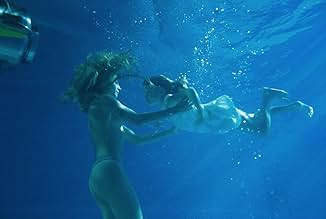Varias vidas coinciden en una isla, conectadas por un autor cuya novela se entrelaza con su propia vida.Varias vidas coinciden en una isla, conectadas por un autor cuya novela se entrelaza con su propia vida.Varias vidas coinciden en una isla, conectadas por un autor cuya novela se entrelaza con su propia vida.
- Dirección
- Guionista
- Elenco
- Premios
- 11 premios ganados y 18 nominaciones en total
María Álvarez
- Enfermera
- (as María Alvarez)
Javier Coromina
- Camarero Chiringuito
- (as Javier Corominas)
Alesandra Álvarez
- Luna 1 año
- (as Alesandra Alvarez)
José Ferreira
- Emplastro
- (sin créditos)
- Dirección
- Guionista
- Todo el elenco y el equipo
- Producción, taquilla y más en IMDbPro
Opiniones destacadas
I found this film absolutely terrific. Ik know there's a lot of sex in it and yes, there are a lot of suspicious coincidences, but I looked past that.
For starters, I loved the story, it wasn't boring at all, despite what some may say. It was a sort of twisty fairytale to me, just like 'Los Amantes del Circulo Polàr' was. I love good fairy tales!
The acting was very good by most actors (I love you Najwa!), and good by the others. Even the girl that played Luna was convincing.
The film has a lot of explicit scenes (sexual and non-sexual) but besides from that Médem accomplishes to put a lot of suggestion in it (sexual and non-sexual). If you watch it attentively and past merely what you see, you will notice the subtlety of the characters and story.
Last of all i would like to say that the English title (Sex and Lucia) is an abomination to the original title (Lucia y el Sexo). The word are the same, but the word order has flipped, which gives the title a whole other meaning, to my opinion. The film is about Lucia and the meaning sex has in her life and the life of others. It is not about sex and the way Lucia handles with it. The meaning of film titles is often lost in translation (no pun intended). Why can't American (and other) people keep the original title? We can in Belgium.
A la proxima
For starters, I loved the story, it wasn't boring at all, despite what some may say. It was a sort of twisty fairytale to me, just like 'Los Amantes del Circulo Polàr' was. I love good fairy tales!
The acting was very good by most actors (I love you Najwa!), and good by the others. Even the girl that played Luna was convincing.
The film has a lot of explicit scenes (sexual and non-sexual) but besides from that Médem accomplishes to put a lot of suggestion in it (sexual and non-sexual). If you watch it attentively and past merely what you see, you will notice the subtlety of the characters and story.
Last of all i would like to say that the English title (Sex and Lucia) is an abomination to the original title (Lucia y el Sexo). The word are the same, but the word order has flipped, which gives the title a whole other meaning, to my opinion. The film is about Lucia and the meaning sex has in her life and the life of others. It is not about sex and the way Lucia handles with it. The meaning of film titles is often lost in translation (no pun intended). Why can't American (and other) people keep the original title? We can in Belgium.
A la proxima
This movie in my view is not understandable without any notion of the 'soul', whose movements are made visible by magnificent underwater shots. The sexual scenery functions not only as entrance to the story; I think Medem really wanted to depict something like 'the ultimate sex' both as experience and as ultimate, divine ideal, something like Goethes 'eternal feminine.' As something to strive for, it can deeply affect our lives by giving it the splendour we need to keep it worthwhile, even if we fail. At the same time, it is also a power deep down, a dark shadow that haunts us. It's for us to see, to accept, and to decide: do we want to go to our island and unite the two, as Lucia does? In that case, we might see that in the end our stories come true as well, be it by breaking in in the middle.
The question I asked myself after watching the movie for the third time was: where exactly is this 'middle' of it? It seems to me that it's around the scene where Elena is walking through Madrid with Luna in her baby carriage, while passing the apartment of Lucia and Lorenzo. From then on, the decisions made by the novelist - like the shivery death of his child - are such that there is no way back. Lorenzo, Lucia and their relationship are too heavily shaken up. Both have to get into a new reality which can transform their personalities; to both, this means a form of dying and leaving their old personalities behind. They surely resist this, especially Lorenzo; but also he has to put himself at risk, following the demands of his 'blood', that is, of his sex, death and rebirth. And there the story takes over the initiative from the writer, who himself is thrown into it - in the middle, where he leaves his home and runs into his 'accident'. Exactly that scene is not shown - it's the hole in the middle, through which the old reality passes into the new.
For me, this movie is a small masterpiece, which shows how film and literature can work together, and how more powerful ideas about ourselves are then the circumstances we are put into. The 'form' of the persons is therefore changeable: like Lorenzo during the last Island episode has 'changed' into Carlos. As the 'transformed' Lorenzo turns up on the island, with his distress and his love for both Elena and Lucia, 'Carlos' is no longer necessary and the women can leave him behind. The fact that Elena is eventually able to weep, marks the acceptance of her loss, which 'naturally' returns her child to her from the middle of the picture again.
The question I asked myself after watching the movie for the third time was: where exactly is this 'middle' of it? It seems to me that it's around the scene where Elena is walking through Madrid with Luna in her baby carriage, while passing the apartment of Lucia and Lorenzo. From then on, the decisions made by the novelist - like the shivery death of his child - are such that there is no way back. Lorenzo, Lucia and their relationship are too heavily shaken up. Both have to get into a new reality which can transform their personalities; to both, this means a form of dying and leaving their old personalities behind. They surely resist this, especially Lorenzo; but also he has to put himself at risk, following the demands of his 'blood', that is, of his sex, death and rebirth. And there the story takes over the initiative from the writer, who himself is thrown into it - in the middle, where he leaves his home and runs into his 'accident'. Exactly that scene is not shown - it's the hole in the middle, through which the old reality passes into the new.
For me, this movie is a small masterpiece, which shows how film and literature can work together, and how more powerful ideas about ourselves are then the circumstances we are put into. The 'form' of the persons is therefore changeable: like Lorenzo during the last Island episode has 'changed' into Carlos. As the 'transformed' Lorenzo turns up on the island, with his distress and his love for both Elena and Lucia, 'Carlos' is no longer necessary and the women can leave him behind. The fact that Elena is eventually able to weep, marks the acceptance of her loss, which 'naturally' returns her child to her from the middle of the picture again.
This Spanish film has an unusual look and feel and dares to take chances in the way that it mixes fantasy and reality. The result is an interesting film, which is often confusing and frustrating. I'm sure that this was not entirely accidental and that the filmmakers wanted to keep the audience in a state of disorientation. Nevertheless, the convolutions of the story appear to serve no other purpose than to keep us off balance.
The films biggest sin is the scene in the middle of the film where the daughter Luna opens the bedroom door. The following event is presented in such a way that we are left guessing as to what has just happened. There's no reason for withholding it, except the misguided idea that lack of clarity is artistically valuable. I think that despite it's flaws, this film shows a great vibrancy and energy.
People talk a lot about the sex scenes. The film doesn't have much to say about sex and it certainly isn't about sex. Nevertheless, the scenes do not seem tacked on for the sake of it and, in an era when Hollywood seems to be gripped by a new puritanism, it's refreshing to see a frank depiction of what is, after all, an important aspect of the relationship between these characters.
The films biggest sin is the scene in the middle of the film where the daughter Luna opens the bedroom door. The following event is presented in such a way that we are left guessing as to what has just happened. There's no reason for withholding it, except the misguided idea that lack of clarity is artistically valuable. I think that despite it's flaws, this film shows a great vibrancy and energy.
People talk a lot about the sex scenes. The film doesn't have much to say about sex and it certainly isn't about sex. Nevertheless, the scenes do not seem tacked on for the sake of it and, in an era when Hollywood seems to be gripped by a new puritanism, it's refreshing to see a frank depiction of what is, after all, an important aspect of the relationship between these characters.
10Core242
The earlier film by Julio Médem (Lovers of the Arctic Circle) is a prelude to the kind of cinematography that this Spanish film director/writer presents here. I have read most of the other comments, but they don't do justice to it, mainly because of the lack of understanding the original tongue of this film. The screenplay is excellent, full of metaphors and a rich use of very carefully chosen words. People who consider this film just an excuse for depicting sex scenes as the highlight of the movie are pretty much clueless. It is more than that, it is the complex storytelling that tangles the characters in this movie and the way that is told. Compelling and breath-taking. A must see.
Written reality. I had the unexpected pleasure of seeing this soon after Ruiz's Proust. Both about writers creating a life.
Time folding. Narrative layers.
The three sisters from 'Alice in Wonderland,' here named Alsi/Elana, Lucia (the Alice, an anagram, in fact one that Carroll used) and Belin. The story is to Alice, for Alice, about Alice and generates the world that Alice lives in. The lighthouse and hole.
Its less than intelligent in the level of the story: lust drives meaning, but that's because the written novel is at that vulgar level. This film starts slow and ordinary, just as the novel within. But we soon weave all sorts of ambiguous narrative threads, each creating the other. The last half of the film is a bedtime story, a novel, a suicide note, a coma-induced dream, a recipe, an internet communication, a climax-induced hallucination, a blindfolded taste.
A man loves three women. Another man mirrors him. Lots of coupling, ethereal angst,
Two of the sisters plus the author (and his double), all possibly dead (all possibly fictional), on the island of conception. And the story starts again halfway.
Some lightly nuanced direction here. Endearment without cloying. The only thing in this film that is not sensually romantic is that the computer is a PeeCee and not a Mac. You'd think they'd know.
Ted's Evaluation -- 3 of 4: Worth watching.
Time folding. Narrative layers.
The three sisters from 'Alice in Wonderland,' here named Alsi/Elana, Lucia (the Alice, an anagram, in fact one that Carroll used) and Belin. The story is to Alice, for Alice, about Alice and generates the world that Alice lives in. The lighthouse and hole.
Its less than intelligent in the level of the story: lust drives meaning, but that's because the written novel is at that vulgar level. This film starts slow and ordinary, just as the novel within. But we soon weave all sorts of ambiguous narrative threads, each creating the other. The last half of the film is a bedtime story, a novel, a suicide note, a coma-induced dream, a recipe, an internet communication, a climax-induced hallucination, a blindfolded taste.
A man loves three women. Another man mirrors him. Lots of coupling, ethereal angst,
Two of the sisters plus the author (and his double), all possibly dead (all possibly fictional), on the island of conception. And the story starts again halfway.
Some lightly nuanced direction here. Endearment without cloying. The only thing in this film that is not sensually romantic is that the computer is a PeeCee and not a Mac. You'd think they'd know.
Ted's Evaluation -- 3 of 4: Worth watching.
¿Sabías que…?
- TriviaSome of the most sexual explicit content was made by doubles, not by the main actors.
- ErroresA full moon between two buildings is shown during midday when Lorenzo meets his daughter Luna for the first time - which is astronomically impossible.
- Créditos curiososCredits scroll in the opposite direction.
- Versiones alternativasThe US cut removes most of the frontal nudity and runs approximately 2 minutes shorter.
- ConexionesFeatured in Brows Held High: Room in Rome (2013)
- Bandas sonorasUn Rayo de Sol
Written by Daniel Vangarde (as Vangarde), Claude Carrère and Amado Jaén (as Jaen)
(c) Bleu Blanc Rouge Editions Soc - Editions Productions Zagora
Ediciones Musicales Clipper's, S.L.
Selecciones populares
Inicia sesión para calificar y agrega a la lista de videos para obtener recomendaciones personalizadas
- How long is Sex and Lucía?Con tecnología de Alexa
Detalles
- Fecha de lanzamiento
- Países de origen
- Sitio oficial
- Idiomas
- También se conoce como
- Sex and Lucía
- Locaciones de filmación
- Productoras
- Ver más créditos de la compañía en IMDbPro
Taquilla
- Total en EE. UU. y Canadá
- USD 1,594,779
- Fin de semana de estreno en EE. UU. y Canadá
- USD 47,591
- 14 jul 2002
- Total a nivel mundial
- USD 7,640,680
- Tiempo de ejecución
- 2h 8min(128 min)
- Color
- Mezcla de sonido
- Relación de aspecto
- 2.35 : 1
Contribuir a esta página
Sugiere una edición o agrega el contenido que falta




























